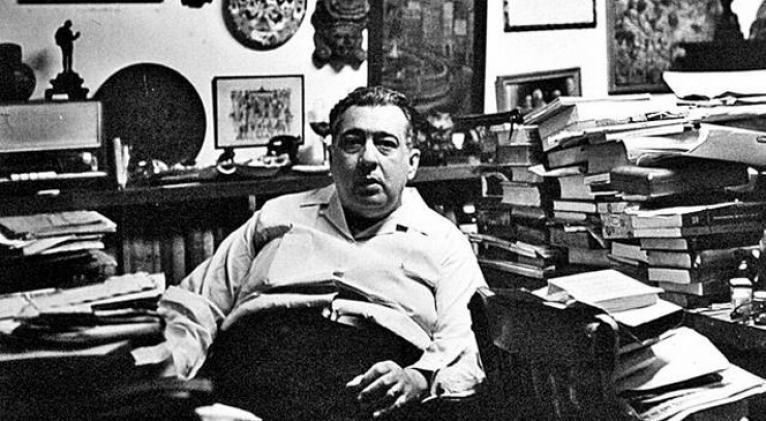Paradiso, by José Lezama Lima, is a masterpiece, an apotheosis of the symbolic. Lezama's expressive torrent runs wild at times in similes and metaphors that border on the absurd, the whimsical (literature is also a game, provocation), in deliriously baroque constructions, going back and forth, mazes in which it is difficult to find the thread... but in chaos there is order: Paradiso is the journey to the essences, the alleged pact of coexistence between the historical (it cannot be forgotten that it is an autobiographical novel to a certain extent) and the imagined, a settlement of multiple readings, a philosophical and moral examination, mystical experience, inventory of customs, sensual and erotic delight... All at once, a "summa", as the writer himself would say.
José Lezama Lima is the inimitable writer. It would be sterile and ridiculous to try: his style is a consequence of the image he has formed of the world. Both are inseparable, and therefore unrepeatable. Evocations of him become testimony, although he has often sacrificed clarity in pursuit of fidelity to what he glimpsed.
Lezama continues to be a rare bird in the literary panorama of the Spanish language. He was nurtured from here and there, from life itself, but he gave birth to creatures that made visions of the human and the divine stumble. Island on an island, his work continues to challenge and seduce us.
FIRST PAGE
Baldovina's hand separated the tulle at the entrance to the mosquito net, poked around, squeezing gently as if she were a sponge and not a five-year-old child; she opened the shirt and looked at the boy's chest full of welts, furrows of violent coloration, and the chest that bulged and shrank as if having to make a powerful effort to reach a natural rhythm. She also opened the door of the nightgown and saw the thighs, the small testicles full of welts that were getting bigger, and as she extended her hands even more she noticed the cold and trembling legs. At that moment, twelve o'clock at night, the lights in the houses of the military camp turned off and those of the guard posts turned on and the lanterns of the patrol guards became a wandering monster that descended from the puddles, scaring away the beetles.
Baldovina was desperate, disheveled. She looked like a stewardess who with a waiter in her arms was retreating piece after piece in the burning of a castle, carrying out the orders of her lords while fleeing away. She already needed help, because every time she removed the mosquito net, she saw her body stretch out and give more relief to the welts. Terrified, to fulfill the desire that she already had to flee, she pretended that she was looking for the other pair of servants. The orderly and Truni greeted her arrival with joyful surprise. With her eyes open to all belief, she spoke without finding the words of the remedy that the abandoned creature needed. She said the body and the welts, as if she always saw them grow or as if she slowly moved the spiral of her plate, of wrong gelatin, saw the ghostly and rosy apparition, the migration of those clouds over the little body. While the welts recovered all over the body, the panting indicated that the asthma left so much air inside the creature that it seemed that it was going to hit the exit of the pores. The half-open door where Baldovina had arrived showed the couple with the blankets from the bed on their shoulders, as if the apparition of the arriving figure had a speed in its demands, which led them to a posture similar to a mountain of sand. that it would have folded on their roofs, letting them barely glimpse the spectacle from the same position of the flight. Very slowly they told him to rub it with alcohol, since surely the antlion had stung the boy when she was jumping through the garden. And that the wheezing of asthma was unimportant, that it came and went, and that during that time the body lent itself to that pain and then withdrew without losing true health and enjoyment.
Translated by Sergio A. Paneque Díaz / CubaSí Translation Staff


Deje un comentario